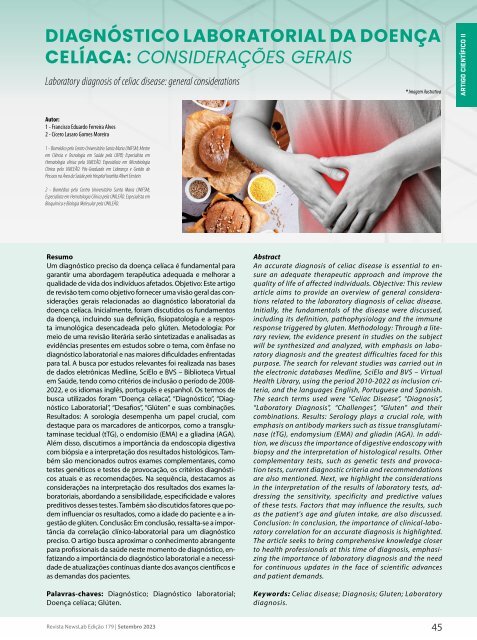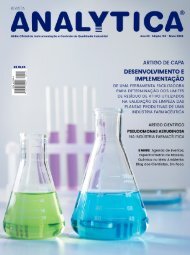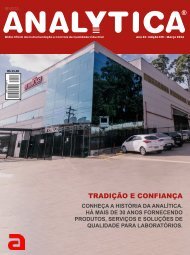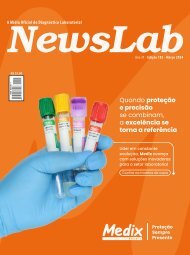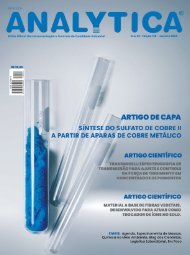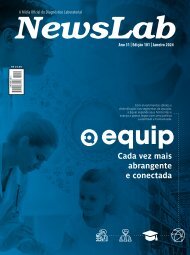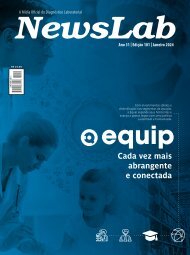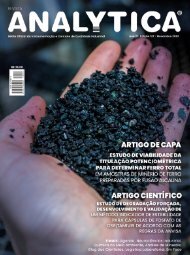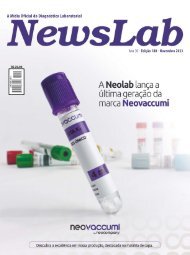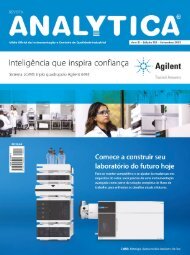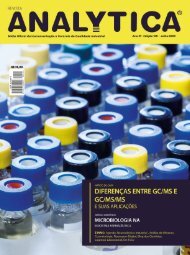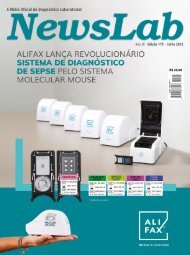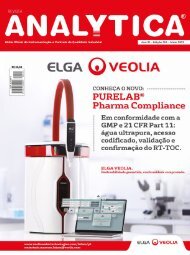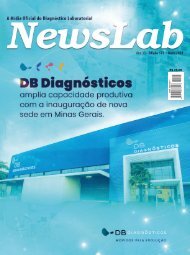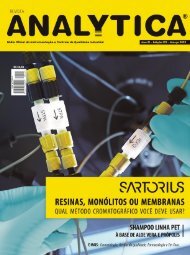Revista Newslab Edição 179
Revista Newslab Edição 179 - Setembro 2023
Revista Newslab Edição 179 - Setembro 2023
Create successful ePaper yourself
Turn your PDF publications into a flip-book with our unique Google optimized e-Paper software.
DIAGNÓSTICO LABORATORIAL DA DOENÇA<br />
CELÍACA: CONSIDERAÇÕES GERAIS<br />
Laboratory diagnosis of celiac disease: general considerations<br />
* Imagem ilustrativa<br />
ARTIGO CIENTÍFICO II<br />
Autor:<br />
1 - Francisco Eduardo Ferreira Alves<br />
2 - Cícero Lasaro Gomes Moreira<br />
1 - Biomédico pelo Centro Universitário Santa Maria UNIFSM; Mestre<br />
em Ciência e Tecnologia em Saúde pela UEPB; Especialista em<br />
Hematologia clínica pela UNILEÃO. Especialista em Microbiologia<br />
Clínica pela UNILEÃO. Pós-Graduado em Liderança e Gestão de<br />
Pessoas na Área da Saúde pelo Hospital Israelita Albert Einstein.<br />
2 - Biomédico pelo Centro Universitário Santa Maria UNIFSM;<br />
Especialista em Hematologia Clínica pela UNILEÃO. Especialista em<br />
Bioquímica e Biologia Molecular pela UNILEÃO.<br />
Resumo<br />
Um diagnóstico preciso da doença celíaca é fundamental para<br />
garantir uma abordagem terapêutica adequada e melhorar a<br />
qualidade de vida dos indivíduos afetados. Objetivo: Este artigo<br />
de revisão tem como objetivo fornecer uma visão geral das considerações<br />
gerais relacionadas ao diagnóstico laboratorial da<br />
doença celíaca. Inicialmente, foram discutidos os fundamentos<br />
da doença, incluindo sua definição, fisiopatologia e a resposta<br />
imunológica desencadeada pelo glúten. Metodologia: Por<br />
meio de uma revisão literária serão sintetizadas e analisadas as<br />
evidências presentes em estudos sobre o tema, com ênfase no<br />
diagnóstico laboratorial e nas maiores dificuldades enfrentadas<br />
para tal. A busca por estudos relevantes foi realizada nas bases<br />
de dados eletrônicas Medline, SciElo e BVS – Biblioteca Virtual<br />
em Saúde, tendo como critérios de inclusão o período de 2008-<br />
2022, e os idiomas inglês, português e espanhol. Os termos de<br />
busca utilizados foram “Doença celíaca”, “Diagnóstico”, “Diagnóstico<br />
Laboratorial”, “Desafios”, “Glúten” e suas combinações.<br />
Resultados: A sorologia desempenha um papel crucial, com<br />
destaque para os marcadores de anticorpos, como a transglutaminase<br />
tecidual (tTG), o endomísio (EMA) e a gliadina (AGA).<br />
Além disso, discutimos a importância da endoscopia digestiva<br />
com biópsia e a interpretação dos resultados histológicos. Também<br />
são mencionados outros exames complementares, como<br />
testes genéticos e testes de provocação, os critérios diagnósticos<br />
atuais e as recomendações. Na sequência, destacamos as<br />
considerações na interpretação dos resultados dos exames laboratoriais,<br />
abordando a sensibilidade, especificidade e valores<br />
preditivos desses testes. Também são discutidos fatores que podem<br />
influenciar os resultados, como a idade do paciente e a ingestão<br />
de glúten. Conclusão: Em conclusão, ressalta-se a importância<br />
da correlação clínico-laboratorial para um diagnóstico<br />
preciso. O artigo busca aproximar o conhecimento abrangente<br />
para profissionais da saúde neste momento de diagnóstico, enfatizando<br />
a importância do diagnóstico laboratorial e a necessidade<br />
de atualizações contínuas diante dos avanços científicos e<br />
as demandas dos pacientes.<br />
Palavras-chaves: Diagnóstico; Diagnóstico laboratorial;<br />
Doença celíaca; Glúten.<br />
<strong>Revista</strong> NewsLab <strong>Edição</strong> <strong>179</strong> | Setembro 2023<br />
Abstract<br />
An accurate diagnosis of celiac disease is essential to ensure<br />
an adequate therapeutic approach and improve the<br />
quality of life of affected individuals. Objective: This review<br />
article aims to provide an overview of general considerations<br />
related to the laboratory diagnosis of celiac disease.<br />
Initially, the fundamentals of the disease were discussed,<br />
including its definition, pathophysiology and the immune<br />
response triggered by gluten. Methodology: Through a literary<br />
review, the evidence present in studies on the subject<br />
will be synthesized and analyzed, with emphasis on laboratory<br />
diagnosis and the greatest difficulties faced for this<br />
purpose. The search for relevant studies was carried out in<br />
the electronic databases Medline, SciElo and BVS – Virtual<br />
Health Library, using the period 2010-2022 as inclusion criteria,<br />
and the languages English, Portuguese and Spanish.<br />
The search terms used were “Celiac Disease”, “Diagnosis”,<br />
“Laboratory Diagnosis”, “Challenges”, “Gluten” and their<br />
combinations. Results: Serology plays a crucial role, with<br />
emphasis on antibody markers such as tissue transglutaminase<br />
(tTG), endomysium (EMA) and gliadin (AGA). In addition,<br />
we discuss the importance of digestive endoscopy with<br />
biopsy and the interpretation of histological results. Other<br />
complementary tests, such as genetic tests and provocation<br />
tests, current diagnostic criteria and recommendations<br />
are also mentioned. Next, we highlight the considerations<br />
in the interpretation of the results of laboratory tests, addressing<br />
the sensitivity, specificity and predictive values<br />
of these tests. Factors that may influence the results, such<br />
as the patient's age and gluten intake, are also discussed.<br />
Conclusion: In conclusion, the importance of clinical-laboratory<br />
correlation for an accurate diagnosis is highlighted.<br />
The article seeks to bring comprehensive knowledge closer<br />
to health professionals at this time of diagnosis, emphasizing<br />
the importance of laboratory diagnosis and the need<br />
for continuous updates in the face of scientific advances<br />
and patient demands.<br />
Keywords: Celiac disease; Diagnosis; Gluten; Laboratory<br />
diagnosis.<br />
45


